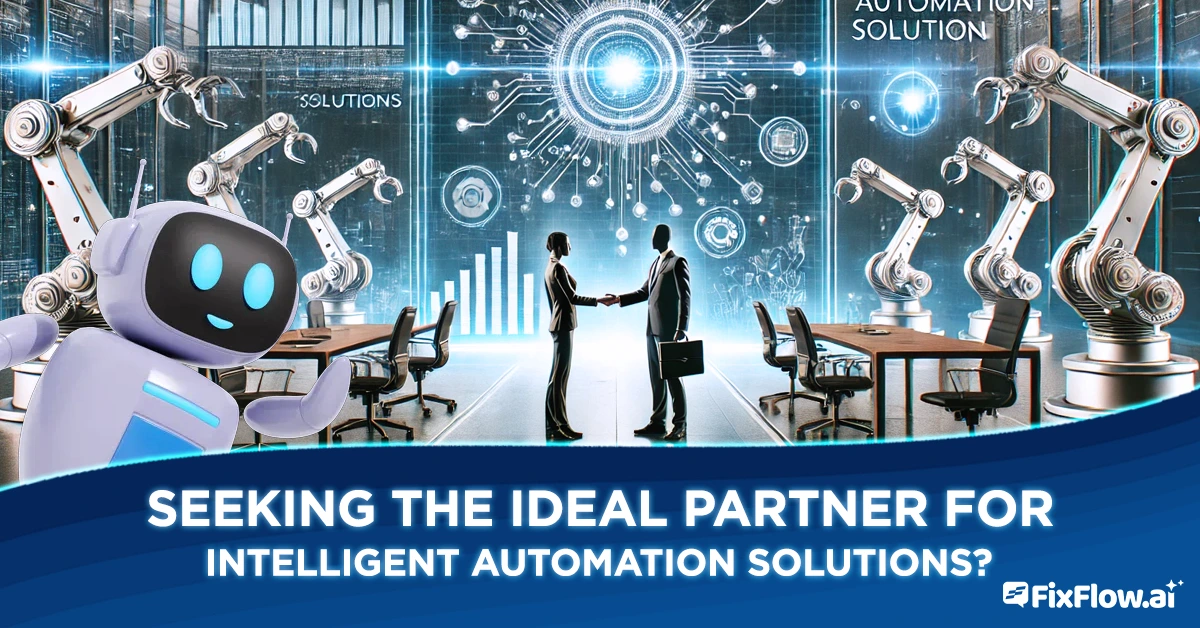Seeking the Ideal Partner for Intelligent Automation Solutions?
When seeking the ideal partner for intelligent automation solutions, start by understanding your business needs and mapping workflows to identify automation opportunities. You’ll want a partner with deep technological expertise and industry experience that matches your sector’s challenges. Their ability to innovate and scale solutions as your business grows is crucial. Reviewing their proven track record through client testimonials and case studies is important. Ensure shared values and vision for seamless collaboration and support in transforming your operations. With the right partner, you can elevate your business potential. There’s more to explore when optimizing your automation strategy.
Understanding Your Business Needs
When you embark on integrating intelligent automation into your business, understanding your specific needs is a critical first step. Looking closer at your current business process management (BPM) is essential to identify areas where automation can bring the most value. Start by mapping out your workflows and pinpointing tasks that are repetitive or prone to human error. Intelligent automation can streamline these tasks, enhancing operational efficiency and freeing valuable resources for more strategic activities.
Customization is key. Not all solutions fit every business, so tailor your automation strategy to match your unique operational requirements. A customizable approach ensures the technology aligns with your goals and grows with your company. This adaptability supports current needs and positions you for future expansion.
Furthermore, prioritize client support when considering intelligent automation solutions. Reliable support can significantly improve implementation, ensuring issues are swiftly addressed and your system runs smoothly. By clearly understanding your business needs and focusing on BPM, customization, and client support, you’ll be well-equipped to move forward with intelligent automation and achieve the operational efficiency you desire.
Evaluating Technological Expertise
As you align your automation strategy with your business needs, assessing the technological expertise of potential partners becomes paramount. You need a partner with a deep understanding of the technology stack that underpins intelligent automation. Their technical expertise should be evident in their ability to navigate complex systems and seamlessly integrate solutions that meet your requirements. It’s essential to evaluate their industry experience—partners who’ve successfully implemented solutions in your sector are more equipped to anticipate challenges and tailor their offerings accordingly.
When examining potential partners, look for those who prioritize solution integration. They should be adept at ensuring that new tools work harmoniously with your existing systems, minimizing disruptions. Customization and scalability are also crucial factors. Your ideal partner should offer solutions flexible enough to adapt to your unique business processes and scalable enough to grow alongside your company. This ability to evolve is crucial for long-term success.
In essence, the right partner is technically proficient, understands your industry’s nuances, and provides tailored, scalable solutions that integrate seamlessly into your organization. Choose wisely, and you’ll set your business on a path to sustained growth and innovation.
Assessing Innovation Capabilities
Innovation is the heartbeat of intelligent automation solutions, driving the evolution of business processes and enabling companies to stay ahead of the curve. When assessing a potential partner’s innovation capabilities, look for their ability to balance innovation and adaptability. This means they should introduce cutting-edge solutions and adapt these technologies to fit your unique business needs. A solid technology roadmap is crucial, as it outlines how they plan to integrate new technologies over time.
Customization and scalability are equally important. The partner should offer solutions that can be tailored to your specific requirements and scale as your business grows. This ensures that the automation solutions remain relevant and effective, regardless of how your company evolves.
Performance metrics are another key area to consider. A partner committed to continuous improvement will have clear metrics in place to measure the success of their solutions and make necessary adjustments. By focusing on these aspects, you’ll be better equipped to select a partner to deliver innovative, adaptable, and scalable automation solutions that drive long-term success. Remember, the right partner will help you innovate continuously, ensuring your business remains competitive.
Reviewing Proven Track Record
A proven track record is one of the most critical indicators of a partner’s capability to deliver successful, intelligent automation solutions. When selecting a vendor, evaluating their history with robotic process automation (RPA) and other technologies is essential. A partner with a strong track record will have numerous client testimonials highlighting their success stories and value. These testimonials provide insights into the implementation process and help you gauge how smoothly your own deployment might go.
Look for partners who have demonstrated a clear return on investment (ROI) from past projects. It’s not just about having a few successful implementations; it’s about consistently delivering measurable benefits that align with your business goals. Analyze case studies to see how partners have handled challenges and whether they can adapt to diverse business environments.
A reliable partner will openly share their successes and lessons learned, offering transparency that builds trust. By thoroughly reviewing their proven track record, you ensure you choose a partner capable of driving your intelligent automation journey toward tangible outcomes. This step is crucial in making an informed decision that supports your strategic objectives.
Ensuring Aligned Values and Vision
Harmony in vision and values is paramount when selecting a partner for intelligent automation solutions. You want a partner who understands your business transformation goals and is committed to the same principles. This alignment ensures that your robust process automation (RPA) initiatives are implemented with a clear, unified direction. A shared vision fosters strong partnership collaboration, making it easier to create an implementation strategy that resonates with your organization’s ethos and objectives.
When your partner’s values align with yours, they’re more likely to prioritize user adoption, ensuring that your team embraces and effectively utilizes the solutions. This alignment is crucial for the long-term success of intelligent automation projects, as it guarantees that the solutions are tailored to meet your specific needs while reflecting your company culture.
During the selection process, engage in open discussions to understand how potential partners view business transformation and their approach to RPA. Ask about past experiences and examples of successful partnership collaboration. This will help you gauge whether their vision complements yours, paving the way for a seamless implementation strategy and boosting your chances for successful user adoption.
Frequently Asked Questions
How Do Intelligent Automation Solutions Impact Employee Roles and Responsibilities?
You’ll find that intelligent automation solutions significantly impact employee roles and responsibilities. They streamline repetitive tasks, allowing you to focus on more strategic and creative work. While automation might reduce some manual job functions, it also opens opportunities for upskilling and career growth in data analysis and process management. Embrace these changes, as automation enhances efficiency and can lead to a more fulfilling work experience for you and your colleagues.
What Are the Typical Costs Associated With Intelligent Automation Implementation?
When considering intelligent automation implementation, you’ll encounter several typical costs. Initial expenses often include software licensing and purchasing necessary hardware. You’ll also need to budget for integration services and customization to tailor the solution to your needs. Don’t forget about training your team and ongoing support fees. Also, consider potential costs for scaling the solution as your business grows. It’s crucial to plan for these to maximize your investment.
How Can Businesses Ensure Data Privacy With Intelligent Automation Solutions?
You must focus on a few key areas to ensure data privacy with intelligent automation solutions. First, strong encryption and access controls should be implemented to protect sensitive information. Regular security audits should be conducted to identify vulnerabilities. Your solutions must also comply with relevant data protection regulations like GDPR or CCPA. Finally, train your employees on data privacy best practices so everyone understands their role in safeguarding your business’s information.
What Industries Benefit Most From Intelligent Automation Solutions?
You’d be surprised at how many industries benefit from intelligent automation. In finance, it streamlines data processing and compliance. Healthcare uses it for patient data management and appointment scheduling. Retail harnesses it for inventory management and customer service. Manufacturing sees improvements in supply chain and production efficiency. Even legal sectors find it useful for document review. Whatever industry you’re in, automation can enhance efficiency and drive growth, giving you a competitive edge.
How Do Intelligent Automation Solutions Adapt to Regulatory Changes?
Intelligent automation solutions can adapt quickly to regulatory changes by leveraging machine learning and artificial intelligence. These technologies allow systems to update and modify processes based on new compliance requirements. Automation platforms often include built-in compliance features and regular updates to ensure alignment with the latest regulations. This adaptability minimizes risks and helps maintain efficiency in your operations without manual intervention.







